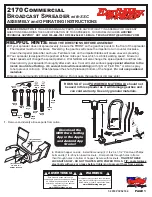
Table 4-1
Computer Setup (F10) Utility menu descriptions (continued)
Heading
Option
Description
Device Security
Makes the following devices available or hidden to the workstation:
●
Serial Port
●
Front USB Ports
●
Rear USB Ports
●
Internal USB Ports
●
System Audio
●
IEEE 1394 Controller (Not available on some models.)
●
Ethernet Controller
●
Ethernet Controller (ASF) (Not available on some models.)
●
SAS Controller (Not available on some models)
●
Legacy Diskette
●
Embedded Security Device
●
SATA 0-
n
For each device, Device Available is the default setting, which lets the operating
system access the device. Device Hidden makes the device unavailable; it is
disabled by the BIOS and cannot be enabled by the operating system.
NOTE:
An entry for enabling DriveLock appears in the setup menu if the
workstation has a DriveLock-compatible hard disk drive.
Embedded
Security Device
This option becomes available if Embedded Device is set to Available.
Embedded Security Device (Hidden or Available) turns the Trusted Platform
Mechanism (TPM) on and off. Device Hidden is the default. If this option is made
available, the following options become available:
●
Power-On Authentication Support—Enables and disables an authentication
feature that requires you to enter a TPM user key password to start the
workstation. This feature uses the TPM to generate and store the
authentication password.
●
Reset Authentication Credential—Resets the authentication functionality and
clears authentication credentials.
To enable the Embedded Security Device and to access any security features
associated with the device, you must enter a setup password.
Setting a device to Available enables the operating system to access the device.
Hidden makes the device unavailable. It is disabled by the BIOS and cannot be
enabled by the operating system.
Network
Service
Boot
Enables or disables the ability to boot to the network using the
F12
key or the
boot order.
38
Chapter 4 System management
ENWW
















































